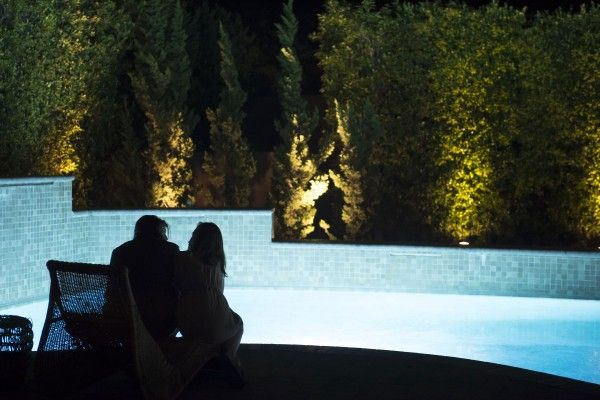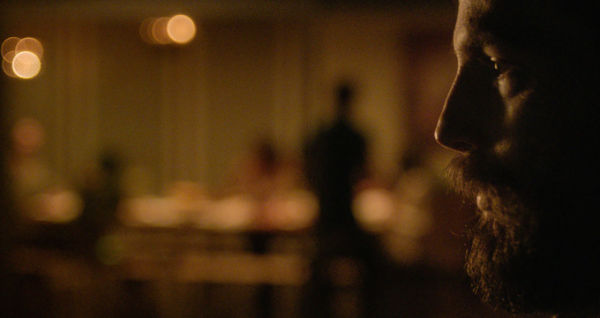I can’t stand these types of movies. The twenty-something friends meet again x-number of years later in their thirties to discover, shocker of all shockers, nothing is the same and you can’t relive your past. These movies tend to be steeped in nostalgic rose tinted hokum masquerading as insight - ‘cause man wasn’t the past just so gosh-darn dandy. They’re always insufferable and almost always star Jason Ritter. The first two-thirds of Karyn Kusama’s The Invitation nearly made me reconsider my innate distaste for this indie ‘Big-Chill’-wannabe subgenre. Kusama’s a smart enough filmmaker to turn the prerequisite standards on their head. It’s not the past each of her newly thirty something characters are chasing; but the past they’re desperately seeking to run away from. The Invitation ultimately is a reunion film about how much reunions suck, why your friends are just as shitty today as they were yesterday. It’s about the impossibility of change and the surface value guise we put up to suggest so-called ‘growth’. That it mucks up the ending and descends into boring schlock by the third act is all the more disappointing considering what’s come before. It’s another near miss from Kusama, following the near miss of Jennifer’s Body after the near miss of Aeon Flux.
Logan Marshall Green fills in for Jason Ritter as Will a somber beardo who along with his new girlfriend Kira (Emayatzy Corinealdi) travel to a dinner party in the Hollywood Hills hosted by his ex-wife Eden (Tammy Blanchard) and her new beau David (Michiel Huisman). The catch - Will hasn’t heard from Eden for over two years, his former flame disappearing suddenly after some unmentionable tragedy.
The central conflict in the film stems from the different ways Eden and Will have coped or not in those two years since. Will is very much still a mess, unable to get past whatever happened to end his & Eden’s relationship. The dinner party becomes a catalyst for Will to remember just what he had and what he’s lost since. Eden, however, appears to have moved on completely, all smiles, preaching about some ‘Invitation’ – an initiative/cult that has helped her to forget all her suffering and worries. To Will – this is unacceptable. How could she possibly have changed so much, while he is still stuck perpetually in the past?
Grief is the constant here, seeping into every action and word spoken. To Will - that Eden has been able to overcome this is not only proof that she’s deluded but indicative of something far more nefarious. As such, Will becomes committed to proving Eden and ‘The Invitation’ - a fraud, if not downright sinister. Whether or not Will is misguided and deluded himself becomes the central crux of the film. The Invitation is at its best when showcasing this tug of war of between Will’s pragmatic despair and the ethereal happiness of Eden/’The Invitation’.
Of course the movie has to choose a side and when it inevitably does, it becomes far less interesting. But for about seventy or so minutes, The Invitation is a fractured look into people desperate to change even if that means becoming different people all together. Is personality mutable? Can you ever truly recover from trauma? Or does it forever linger, the past echoing through like a half-remembered dream? These aren’t easy questions to answer; yet by the end, The Invitation chooses the most easy and palatable conclusion possible, succumbing to the most base genre conventions and abandoning any tonal or thematic relevance it had going. A difficult and ambiguous film suddenly becomes little more than a crowd-pleaser, sating the blood lust expected from so-called horror films.
It’s a shame – because it wastes game work from its cast. Logan Marshall Green, in particular, is terrific as our unreliable narrator Will. The film, wisely told almost exclusively from his perspective, finds just the right balance between putting us in in our lead’s shoes whilst still making us question every action he takes. It’s a credit to Green that such an ambiguous character can become so sympathetic and relatable.
The Invitation is a metaphorical ghost story, where the spirit is the past itself, always hovering about each character, whispering in their ear, making sure they never forget what’s come before. When The Invitation works, it listens to this ghostly cry. And when it doesn’t, the cries become little more than white noise.
C+



